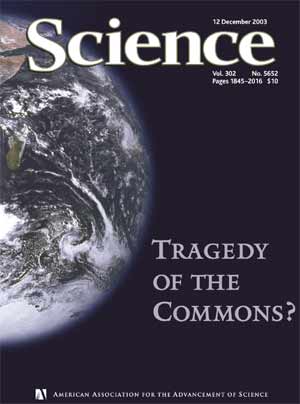Why bad things happen to good people
So our poor protagonist on the last screen was in a classic damned-if-you-do, damned-if-you-don't kind of situation. The animation should clarify a couple of key points:
 A Tragedy of the Commons is not necessarily caused by greed. It's easy to think that "if everyone only took their share, then there would be enough to go around." But this is not always true. Sometimes, there really is not enough to go around, and it's only by taking as much as you can that you have a hope of survival.
A Tragedy of the Commons is not necessarily caused by greed. It's easy to think that "if everyone only took their share, then there would be enough to go around." But this is not always true. Sometimes, there really is not enough to go around, and it's only by taking as much as you can that you have a hope of survival.- A tragedy of the commons can take many forms, but what they all share is an imbalance between common use or ownership of a resource, and private benefit from the resource. Fishing is a commons issue because (at least historically) anyone who could get to the fish had the right to take them for their own personal benefit. Littering is also a commons issue because a clean environment is something we all share, but I can personally get a (small, temporary ) advantage by tossing a candy wrapper or jug of toxic waste out the window rather than disposing of it properly.
- Because of the imbalance between ownership and benefit, individuals do not pay the full cost of what they use. I can add a goat to the village green, without paying to maintain good soil and grass and remove wastes. Likewise, I catch fish but I never have to pay for the "services" of the ocean which provide food and shelter for fish babies.
- Many environmental issues are also commons issues. This is because the environment has (again, historically) been a common resource, while the advantages we get from the environment benefit us as individuals. In fact there is even a phrase for this: ecosystem services, defined as things the environment does for us for free. Like raise fish just waiting to be caught.
Copyright University of Maryland, 2007
You may link to this site for educational purposes.
Please do not copy without permission
requests/questions/feedback email: mathbench@umd.edu